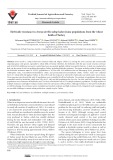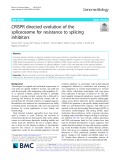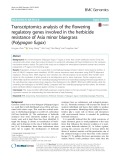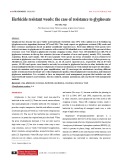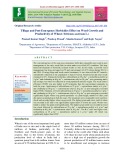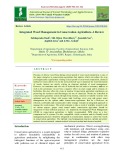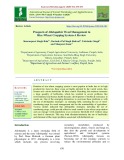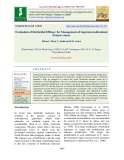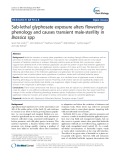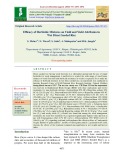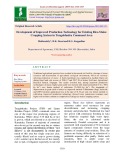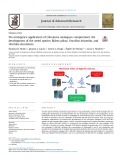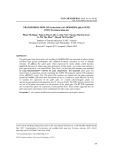
Herbicide resistance
-
Herbicide resistance in Avena sterilis subsp ludoviciana populations from the wheat fields of Turkey
A study was conducted to find out the extent of wild oat problems throughout Turkey including herbicide resistance. This paper includes results of determining the herbicide resistance status of AVELU populations to ACCase and ALS inhibitors that are fenoxaprop (Fen), pinoxaden (Pin), tralkoxydim (Tra), mesosulfuron+iodosulfuron (MeI), and proxycarbazone+mesosulfuron (PrM). AVELU seeds were collected from 213 wheat fields throughout Turkey in 2014–2015 and the response to selected five herbicides was tested under screen-house.
 10p
10p  lyhuyenthu
lyhuyenthu
 31-01-2023
31-01-2023
 5
5
 2
2
 Download
Download
-
Research and production of clean, high-quality and high-yield rice, sustainable environmental protection are the most important and important tasks of many countries in the world as well as in Vietnam today. Therefore, the research, selection and creation of rice varieties that are both high-yield and resistant to pests, weeds, and climate change, in order to minimize the use of herbicides and pesticides.
 8p
8p  viindranooyi
viindranooyi
 07-05-2022
07-05-2022
 8
8
 1
1
 Download
Download
-
Increasing genetic diversity via directed evolution holds great promise to accelerate trait development and crop improvement. We developed a CRISPR/Cas-based directed evolution platform in plants to evolve the rice (Oryza sativa) SF3B1 spliceosomal protein for resistance to splicing inhibitors.
 9p
9p  vigalileogalilei
vigalileogalilei
 27-02-2022
27-02-2022
 5
5
 1
1
 Download
Download
-
Prime editing is a novel and universal CRISPR/Cas-derived precision genome-editing technology that has been recently developed. However, low efficiency of prime editing has been shown in transgenic rice lines. We hypothesize that enhancing pegRNA expression could improve prime-editing efficiency.
 10p
10p  viarchimedes
viarchimedes
 26-01-2022
26-01-2022
 6
6
 0
0
 Download
Download
-
Asia minor bluegrass (Polypogon fugax, P. fugax), a weed that is both distributed across China and associated with winter crops, has evolved resistance to acetyl-CoA carboxylase (ACCase) herbicides, but the resistance mechanism remains unclear. The goal of this study was to analyze the transcriptome between resistant and sensitive populations of P. fugax at the flowering stage.
 13p
13p  vilarryellison
vilarryellison
 29-10-2021
29-10-2021
 11
11
 1
1
 Download
Download
-
This study reports on glyphosate resistant (GR) weeds and their resistance mechanisms based on global scientifically reported cases. Forty-nine different weed species have evolved resistance to glyphosate in 29 countries with a total of 318 identified cases worldwide. Fifty percent of these resistance cases were found in glyphosate-resistant cropping systems.
 7p
7p  nguaconbaynhay12
nguaconbaynhay12
 13-06-2021
13-06-2021
 4
4
 1
1
 Download
Download
-
The conventional use of the same post-emergence herbicides repeatedly may result in poor management of the early weed flush in wheat under zero-tilled (ZT) condition. This may hasten development of herbicide resistant weeds as well. In this study, a possible weed management has been envisaged in ZT and conventional till (CT) wheat during 2013-14 and 2014-15 using tillage and weed control treatments. It was observed that ZT caused a considerable reduction in the population of narrow-leaved, broad-leaved and total weeds compared to CT.
 9p
9p  chauchaungayxua8
chauchaungayxua8
 03-10-2020
03-10-2020
 10
10
 1
1
 Download
Download
-
Presence of diverse weed flora during critical period of crop-weed competition, is one of the major obstacles in conservation agriculture that reduces which can reduce the crop yield appreciably significantly. During critical period of crop-weed competition, chemical method of weed control is by far the most preferred way to minimize the weed infestation of weeds, farmers are mostly relying on chemical methods of weed management.
 14p
14p  caygaocaolon7
caygaocaolon7
 18-09-2020
18-09-2020
 13
13
 2
2
 Download
Download
-
Rotation of rice-wheat cropping system is most popular in India due to its high productivity; however, these crops are highly infested by the varied weeds, thus farmers use various herbicides for their control. Resulting, this rotation consumes a large quantity of herbicides, which has resulted in severe problems like environmental and human health hazards; development of herbicide resistance in weeds etc.
 4p
4p  angicungduoc6
angicungduoc6
 22-07-2020
22-07-2020
 11
11
 1
1
 Download
Download
-
Widespread resistance in Phalaris minor is a major challenge for sustainable productivity. Recent increases in the development of herbicide resistance in Phalaris minor worldwide demand a high up strategies to control this weed. Herbicide-resistant weeds are a constraint to weed management. The use of potential management strategies is crucial in assuring sustainable production. A pot-culture experiment was conducted during the winter season of 2017-18 with the objective to evaluate the herbicidal efficacy for management of isoproturon-resistant Phalaris minor.
 11p
11p  quenchua6
quenchua6
 15-06-2020
15-06-2020
 9
9
 2
2
 Download
Download
-
The increased selection pressure of the herbicide glyphosate has played a role in the evolution of glyphosate-resistance in weedy species, an issue that is becoming a threat to global agriculture. The molecular components involved in the cellular toxicity response to this herbicide at the expression level are still unidentified.
 12p
12p  viminato2711
viminato2711
 22-05-2020
22-05-2020
 7
7
 2
2
 Download
Download
-
Herbicide resistance in weedy plant populations can develop through different mechanisms such as gene flow of herbicide resistance transgenes from crop species into compatible weedy species or by natural evolution of herbicide resistance or tolerance following selection pressure.
 10p
10p  viminato2711
viminato2711
 22-05-2020
22-05-2020
 6
6
 0
0
 Download
Download
-
Direct seeded rice having weed diversity in a substantial amount and the use of single herbicide for weed management is ineffective to control the wide range of weed hence chances of weed flora shift and herbicide resistance in weeds is expected. So to study the efficacy of herbicide mixtures in wet direct seeded rice, an experiment was conducted at Institute Research Farm of ICAR-National Rice Research Institute, Cuttack (Odisha) during kharif season of 2017.
 6p
6p  trinhthamhodang5
trinhthamhodang5
 16-05-2020
16-05-2020
 13
13
 1
1
 Download
Download
-
Water chickweed (Myosoton aquaticum (L.)) is a dicot broadleaf weed that is widespread in winter fields in China, and has evolved serious resistance to acetolactate synthase (ALS) inhibiting herbicides.
 14p
14p  vishikamaru2711
vishikamaru2711
 29-04-2020
29-04-2020
 9
9
 1
1
 Download
Download
-
Waterhemp (Amaranthus tuberculatus (Moq.) J.D. Sauer) is a problem weed commonly found in the Midwestern United States that can cause crippling yield losses for both maize (Zea mays L.) and soybean (Glycine max L. Merr).
 19p
19p  vishikamaru2711
vishikamaru2711
 25-04-2020
25-04-2020
 4
4
 0
0
 Download
Download
-
It was examined that weeds cause a lot of problems in the crop field. Weeds compete with the main crop for nutrients, water, food, space, sunlight etc. Weeds utilize the nutrients provided to the main crop and sometimes dominate the main crop. Some weeds are very noxious and they are harmful for both humans as well as animals. It is clearly revealed from studies done in field of weeds that use of herbicides used to control weeds cause many effects on soil as it leads to degradation in the quality of soil, water as well as it pollutes environment.
 6p
6p  nguathienthan3
nguathienthan3
 27-02-2020
27-02-2020
 28
28
 1
1
 Download
Download
-
Traditional agricultural practices have resulted in decreased soil fertility, shortage of water resources and deterioration of agricultural ecological environment, which are seriously affecting production of maize. A field experiment was conducted in medium black soil during kharif and rabi season of 2016-17 and 2017-18 at farmer field near Agricultural Research Station, Sirguppa. The results revealed that, among improved production technologies of maize, higher grain yield were noticed with improved method-4 (T5: 7681 kg ha-1 ) over farmer method of cultivation (T1:5840 kg ha-1 ).
 8p
8p  cothumenhmong1
cothumenhmong1
 08-12-2019
08-12-2019
 11
11
 0
0
 Download
Download
-
Invasive species (weeds) contribute to great losses in crop productivity, and one of the strategies for controlling their distribution in the field involves the use of herbicides. However, the development of new formulations for the control of weeds is challenged by environmental issues, increases in the resistance of weeds to herbicides, and poor selectivity of herbicides towards invasive species.
 8p
8p  caygaocaolon1
caygaocaolon1
 13-11-2019
13-11-2019
 10
10
 1
1
 Download
Download
-
The gdhA gene from Escherichia coli encoding a NADPH-GDH was expressed in tobacco plants exhibited high growth performance and enhanced herbicide resistance as well as drought tolerance. In addition, the gdhA gene when expressed in maize plants could increase productivity because of improving stresstolerance.
 14p
14p  vithomasedison2711
vithomasedison2711
 14-08-2019
14-08-2019
 8
8
 0
0
 Download
Download
-
Rice (Oryza sativa L.) is among the most important food crops that provide a staple food for nearly half of the world’s population. Rice crops are prone to various types of stresses, both biotic and abiotic. Biotic stresses include insect pests, fungus, bacteria, viruses, and herbicide toxicity. Among abiotic stresses, drought, cold, and salinity are also well studied in rice.
 9p
9p  vikimsa
vikimsa
 22-02-2019
22-02-2019
 28
28
 0
0
 Download
Download
CHỦ ĐỀ BẠN MUỐN TÌM








